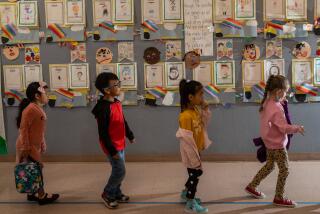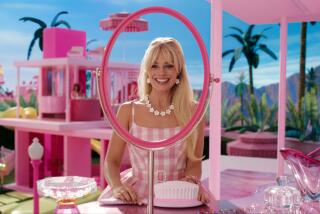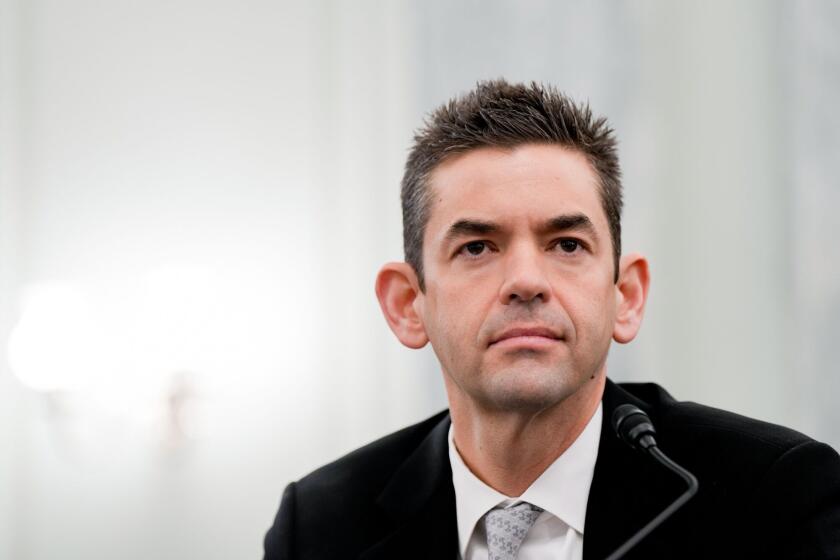On Kids’ Terms : A ‘Growing-Up’ Dictionary Offers Insight Into Child Psychology
- Share via
IN COMING TO grips with the English language, children often make up words to take the place of ones they can’t pronounce or find inadequate or dishonest or otherwise unsuitable. Often these words are better than the ones they supplant.
Our older son, for example, pronounced elephants as “elphanuts,” which was no improvement, etymologically, but had a charm that the original lacked.
Many children pronounce butterflies as “flutterbys,” which is not only equally melodious, but makes more sense because flutter by is exactly what butterflies do.
Evidently butterflies were so named because the butterflies first observed were yellow, and perhaps it seemed to our ancestors that bits of butter were flying by. Not terribly poetic.
Children also have difficulty with names and are inclined to give siblings nicknames that stick a lifetime. My sister’s name was Permelia, a mouthful that I rudely reduced to Baa, something like the sound a sheep makes. Fortunately, the name didn’t stick, though my sister never minded it herself.
In “A Dictionary of Silly Words about Growing Up” by Henry Beard (illustrations by Roy McKie), the author presents words that define the adult world through children’s eyes. These are not actually children’s definitions, but the author’s definitions of children’s concepts of the adult world as imagined by the author. Evidently Beard has been a child because many of the definitions ring true.
Most critical, perhaps, is the definition of the word adult : “A very old child with a huge allowance, easy homework and no bedtime.”
A more sophisticated child might say an adult is a moralistic, authoritarian tightwad with double standards.
But Beard’s children are obviously preteen and haven’t yet learned the antisocial vocabulary of adolescence.
Beard’s definition of advice : “A piece of wisdom from a person who probably first heard and ignored it a long time before you were born.” I don’t see how a teen-ager could have put it better.
Beard’s definition of excuse : “A very good reason why you did something you weren’t supposed to do or didn’t do something you were supposed to do. A not-so-good reason shouted from inside a locked bathroom.”
Family : A group of people who probably would have ended up liking each other if they had gotten together under more favorable circumstances, like at a federal prison or in a train wreck.”
If : “A small word that parents add to promises to turn them into excuses.”
Beard’s children, as you can see, are self-centered, cynical, untrusting, isolated, paranoid, dishonest and resentful. In other words, normal.
Parents surely will recognize their own children’s attitudes in these definitions, although some are likely to think that Beard is too mean, that children, on the contrary, are angels.
I see little evidence that children are angels, but they are usually more perceptive and intelligent than we suppose, more creative, more poetic, more loving and more lonely.
As an 8-year-old, my own definition of adult would have been hardly more amiable than Beard’s: A person you have to depend on for things they won’t let you have.
Beard’s definition of vacation : “A trip to a place where no one can remember when it rained so much.”
Mine wouldn’t be much different: A trip to a place that is 90% boredom and 10% disaster.
Beard understands a child’s view of time : “How long something takes or the moment when it happens. A one-minute commercial (takes) 190 seconds; an hour in math class 115 minutes; an hour at a friend’s house 11 minutes.”
Perhaps most cynical of all his definitions is the one for threat : “The only promise made by adults that they always keep.”
I find a troubling insight in his definition of imagination : “Being able to think of things that haven’t appeared on TV yet.”
I sometimes wonder whether TV’s images of monsters and aliens from space and every kind of threat or disaster haven’t deprived children of their own monstrous fantasies.
I doubt it.
Children live in a world of restraint, anxiety, uncertainty, wonder, betrayal and, of course, in most cases, love.
It is a world especially amenable to the imagination.




